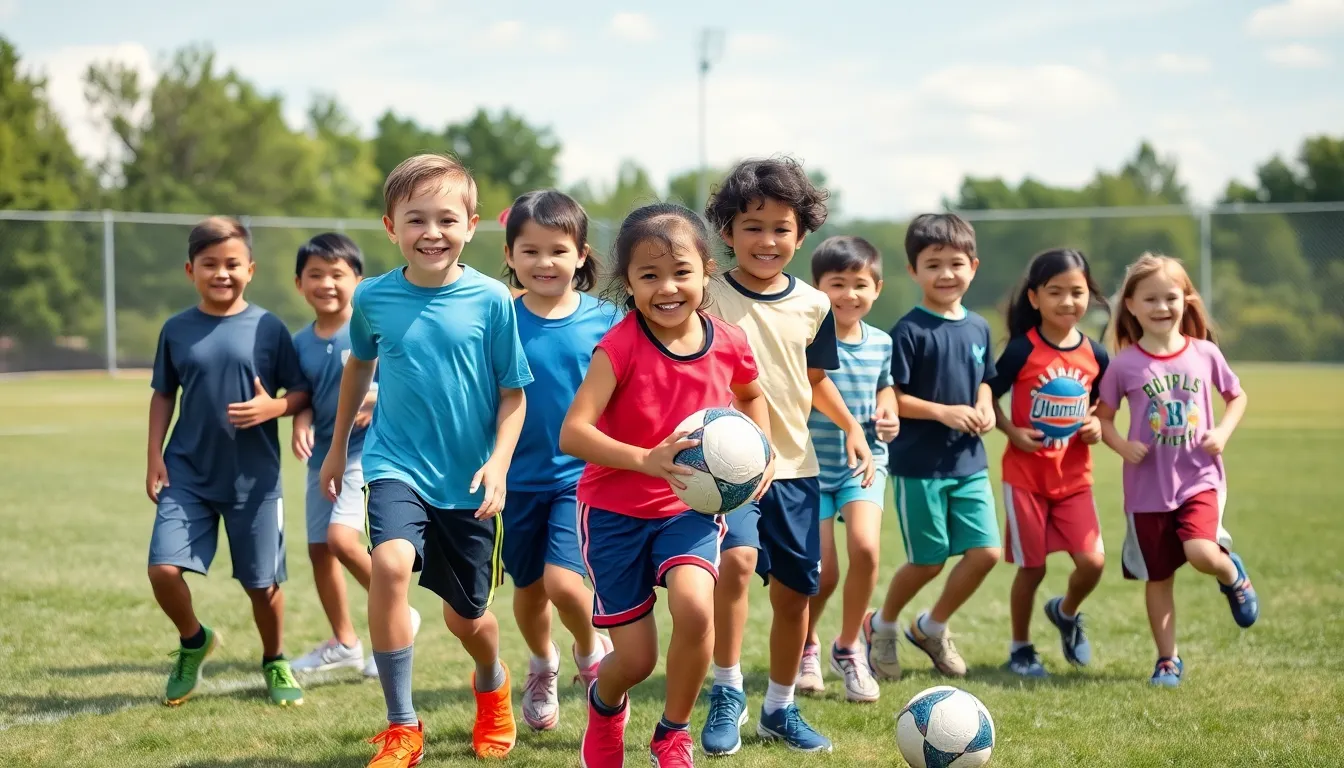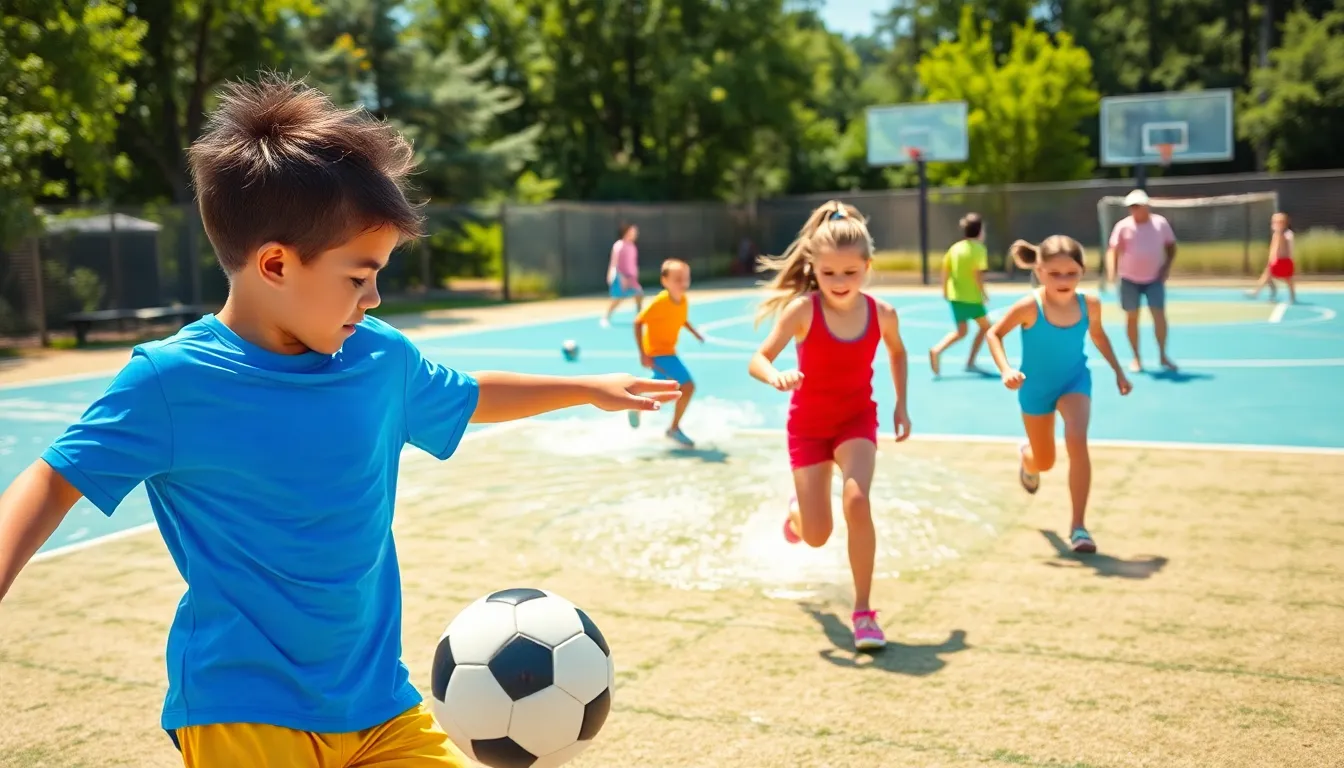As summer approaches, many families start searching for the perfect way to keep their kids active and engaged. Sports summer camps offer an exciting solution, combining physical activity with skill development and social interaction. These camps provide a unique opportunity for children to explore new sports, improve their athletic abilities, and build lasting friendships.
With a variety of programs available, from soccer to swimming to basketball, there’s something for every young athlete. Not only do these camps foster teamwork and sportsmanship, but they also instill a sense of discipline and resilience. Parents can feel confident knowing their children are in a supportive environment where they can thrive both physically and mentally.
Table of Contents
ToggleOverview of Sports Summer Camp
Sports summer camps provide children with opportunities to engage in various athletic activities while fostering personal growth and development. These camps offer structured programs centered around popular sports, including soccer, basketball, swimming, and tennis. Participants enjoy skill-building sessions designed to enhance their performance in specific sports.
Camps emphasize teamwork and collaboration, allowing children to learn vital social skills through cooperative play. Structured environments promote discipline and resilience, encouraging kids to push their limits and strive for improvement. Trained coaches guide participants, ensuring they receive expert instruction tailored to their skill levels.
Families can find camps accommodating different ages and experience levels, making it easy for children to discover new interests or refine existing skills. The combination of physical activity, skill enhancement, and social interaction cultivates a well-rounded experience, making sports summer camps a popular choice for parents and children alike.
Benefits of Attending Sports Summer Camp

Attending sports summer camps offers numerous advantages for children. These benefits span physical fitness, skill development, and social interaction, contributing to a well-rounded experience.
Physical Fitness
Engagement in sports summer camp significantly enhances physical fitness. Children participate in daily activities that promote cardiovascular health, strength, and flexibility. Regular exercise combats obesity and encourages healthier lifestyle choices. Research shows that active children display better overall health and improved focus in school. Camps often include structured workouts and recreational games that keep kids physically engaged while providing a fun atmosphere.
Skill Development
Skill development forms a crucial aspect of sports summer camps. Participants receive expert coaching tailored to their individual skill levels, ensuring that every child can progress effectively. Camps offer specialized training sessions focusing on specific sports, such as soccer, basketball, or swimming, allowing kids to refine their techniques. Enhanced skills boost children’s confidence and can lead to improved performance in school sports and other physical activities.
Social Interaction
Social interaction thrives in the camp environment, fostering friendships and teamwork. Kids collaborate in team sports, learning communication and cooperation skills essential for success in various aspects of life. Camp activities promote inclusivity, helping children develop empathy and respect for others. These experiences lay the foundation for long-lasting relationships and reinforce the value of community and teamwork.
Types of Sports Offered at Camps
Sports summer camps provide a diverse range of activities, accommodating both team and individual sports. The variety ensures that children engage in physical activity while sharpening their skills.
Team Sports
Team sports at camps promote collaboration and communication. Popular options typically include:
- Soccer: Camps often teach fundamental skills like dribbling, passing, and shooting, while emphasizing teamwork and strategy.
- Basketball: Camps focus on shooting, ball handling, and defense techniques, fostering team dynamics through drills and scrimmages.
- Baseball/Softball: Camps cover batting, fielding, and pitching skills, encouraging kids to work together on plays and game strategies.
- Volleyball: Camps enhance serving, passing, and spiking abilities, while promoting cooperative gameplay and support among teammates.
Participating in these sports offers children opportunities for teamwork, sportsmanship, and mutual respect.
Individual Sports
Individual sports develop personal skills and resilience. Key sports offered often include:
- Tennis: Camps focus on stroke development, serving techniques, and match play, empowering children to improve their game independently.
- Swimming: Camps provide stroke techniques, breathing exercises, and safety skills, ensuring children gain confidence in the water.
- Track and Field: Camps allow kids to explore sprints, distance running, and field events, catering to individual strengths and interests.
- Gymnastics: Camps concentrate on flexibility, balance, and agility, helping kids refine their routines and build self-discipline.
Engaging in individual sports at camps helps children set personal goals and achieve a sense of accomplishment, overall enhancing their athletic abilities.
Choosing the Right Sports Summer Camp
Selecting a sports summer camp requires careful consideration of various factors. The right choice can significantly enhance a child’s experience and development.
Factors to Consider
- Program Focus: Evaluate whether the camp specializes in specific sports, such as soccer or swimming, or offers a broader range of activities. A focused program on a single sport can enhance skill development.
- Age Group: Check if the camp accommodates children of different ages and skill levels. Camps designed for specific age groups often tailor their programs to suit developmental needs.
- Location: Assess the camp’s proximity to home. A nearby location simplifies logistics and encourages consistent attendance, which is crucial for skill improvement.
- Duration and Schedule: Look for camps that fit within a family’s summer schedule. Consider half-day versus full-day programs, and the overall length of the camp.
- Expertise of Coaches: Research the qualifications and experience of the coaching staff. Coaches with relevant experience often lead to better training and mentorship for participants.
- Camper-to-Staff Ratio: Analyze the camper-to-staff ratio for personalized attention. A lower ratio typically allows for more individualized coaching and support.
- Facilities and Equipment: Inspect the facilities and available sports equipment. High-quality facilities can enhance the overall experience and safety.
Questions to Ask
- What is the camp’s mission and philosophy? Understanding the camp’s overall approach to sports and child development can help align values with expectations.
- What are the daily schedules like? Knowing the structure of a typical day can give insights into how much time is spent on skill-building versus free play.
- What safety protocols are in place? Inquire about the camp’s health and safety measures, including emergency procedures and supervision standards.
- How are evaluations conducted? Ask about the methods used to assess participants’ skill levels. Feedback systems can guide children’s development.
- What is the refund or cancellation policy? Understanding policies regarding cancellations or refunds helps manage financial expectations.
- Are there opportunities for returning campers? Many camps offer incentives for returning participants, which can indicate a quality program and community.
- What additional activities are included? Check for opportunities for non-sport activities, such as team-building exercises and social events, that can enhance the overall experience.
Sports summer camps offer an enriching experience that goes beyond just physical activity. They provide a unique opportunity for children to develop essential life skills while engaging in their favorite sports. The supportive environment fosters friendships and encourages teamwork, helping kids grow both athletically and socially.
Choosing the right camp can make all the difference in maximizing these benefits. By considering the camp’s focus, coaching expertise, and overall environment, families can ensure their child has a fulfilling and enjoyable summer. With the right camp experience, kids can return to school not only healthier but also more confident and ready to tackle new challenges.




